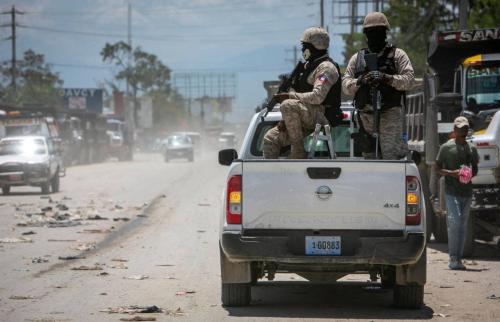Some in the media, examining the so-called “crisis of democracy in Latin America, have concentrated on isolated incidents such as the lynching of a mayor in rural Peru, while others have examined more seminal events such as the ousting of six heads of state in recent years. Yet the main trigger for this wave of doomsaying was a report in May by the United Nations Development Programme on the state of democracy in Latin America. The report found that most respondents would choose a dictator over an elected leader if it provided economic benefits.
There are, no doubt, serious problems in the region: persistent poverty, inequality and high levels of crime and corruption. There are also dangerous trouble spots, such as Venezuela under the mercurial Chavez regime and violence-ridden Colombia. At the same time, there are reasons to believe that Latin America is far from rejecting democracy.
First, while the demise of six elected leaders is remarkable, so is the fact that in virtually every instance, with the exception of Haiti, the ousted leader was replaced peacefully and via constitutional means. And when regimes collapsed in the face of popular protests, the military was notably absent. Most recently, in fragile Bolivia, voters gave their democratic government a vote of confidence in a nation-wide referendum dealing with natural gas reserves.
Second, there are serious disputes regarding the questionable methodology the UNDP team used to analyse the survey data. Other estimates based on the same data, including one by the Latinobarometro, the Chile-based private polling agency, find much lower levels of support for authoritarianism. In particular, critics have questioned the UNDP’s decision to drop about 1,000 responses from the approximate 18,000 sampled. In all questions, the “don’t know” and “no reply” responses were eliminated from its calculations.
A consequence of these changes was an over-representation of those with extreme responses. The Latinobarometro’s analysis of the data, based on the full sample of responses, found that 50 per cent rather than 58 per cent support a non-democratic government that could solve the economic problems.
In addition, one of the report’s findings highlighted by the press was that 58 per cent of respondents said that the president could disregard the law if the country had serious problems. The UNDP later corrected that figure, which it attributed to a typographical error, to 43 per cent. This correction, however, was issued after the result had been underscored by media outlets around the world.
Third, publicity surrounding the UNDP report placed a great deal of emphasis on responses to particular questions in a much longer survey. But there are indications from other questions in the same survey that support for democracy in the region has increased in recent years. For example, in the same year of the same survey that UNDP found that 58 per cent of respondents “would not mind a non-democratic government in power if it could solve the economic problems” (which is already confusing due to the double negatives in the phrasing), 64 per cent answered that “democracy is a preferable form of government compared to authoritarian regimes”.
Our analysis of the same Latinobarometro 2002 data, however, yields a more nuanced diagnosis. In a paper jointly authored with Sandip Sukhtankar, recently published in the Journal of Latin American Studies, we find that respondents in the region are distinguishing between democracy as a system of government and how it works in their countries.
Based on econometric analysis we find that support for democracy increased between 2000 and 2002 in Latin America, and that the largest increases in support were in those countries that we defined as being in “crisis” (having negative gross domestic product growth during the period). At the same time, respondents’ satisfaction with how democracy is working in their country decreased over the period, with the biggest fall coming in the crisis countries.
Satisfaction with how the market is working has also fallen, but generic support for market policies, except for privatisation (which has a negative public image), has remained the same.
It is true that Latin America has problems that merit serious attention from the international community. But the region’s citizens are not about to toss out democracy and return to authoritarian times. They are seeking better performance than most current governments can provide.



Commentary
Op-edLatin America is Far From Rejecting Democracy
August 2, 2004